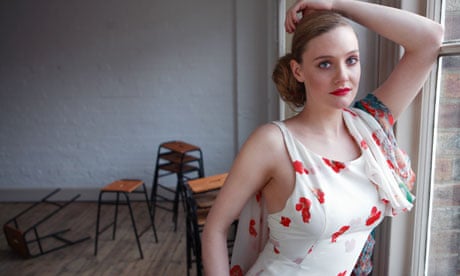Ker-flunk, ker-flunk. Romola Garai thumps across the wooden floor of the photography studio with the grace of a flat-footed Cyberman. She seems unable to control her shoes – a pair of Christian Louboutin platform heels. She looks so elegantly beautiful from the ankle up that her clod-hopping progress is particularly amusing. In the end the photographer comments.
"Yeah," says Garai and stares dispassionately at her feet. "I can't really do shoes."
Garai, it transpires, has very firm ideas about what she does and doesn't do; the way life should be lived, what's important and what she can really do without, thank you very much. This attitude would be admirable in any 28-year-old, but it is particularly interesting in an actor – a profession synonymous with insecurity.
"Acting is a strange job because your control is very limited," says Garai, cheerfully. "Unless you're at peace with that you're going to be unhappy. I think it's harder for men to accept they're just a tool, they're not the generator of art. I don't struggle with it. I feel happy and lucky. In fact I honestly can't think of actresses who are my direct peers whose careers I want. This year I've got amazing roles in things I really believe in. I mean, what more could you want?"
Though Garai is perhaps best known for her roles in period dramas such as Atonement, I Capture the Castle and the 2009 TV series of Jane Austen's Emma, her upcoming projects are juicy and diverse. First up is the four-part BBC adaptation of the much-loved Michel Faber book The Crimson Petal and The White. Garai plays Sugar, a Victorian prostitute who becomes a wealthy man's mistress and is eventually introduced into his suburban household.
"I read a lot, but I don't think I've ever read a character so absolutely conjured as Sugar," says Garai. "I wanted to portray her to the best of my ability and very respectfully. She is so complex, full of paradox. She is also very damaged."
The Crimson Petal director Marc Munden – whose work includes The Devil's Whore and The Mark of Cain – says that Sugar's opaqueness would have made it difficult for audiences to engage with her if weren't for Garai's skill as an actress. "Romola has such intelligence and lively thought going on behind her eyes that she keeps us compelled and seduced, despite Sugar giving little away. She is a great technical actress who also understood instinctively Sugar's guile, her status, her damage."
Playwright Lucinda Coxon adapted the book for the small screen, which pleased Garai. "There's a lot of sex and nudity involved so it was important for me to know that the person making the piece was going to talk about prostitution in a serious and responsible way, because that doesn't often happen."

This aspect was also important to Munden. "The Crimson Petal is also about the mechanics of prostitution," he says. "The base things Sugar puts her body through – the douching, the use of abortifacients, her painful skin condition. Romola was determined that we were unflinching in our depiction of that."
Garai's other big role this year is also in a BBC drama, The Hour, and it is also realised by a woman – Abi Morgan, who created Sex Traffic and adapted Brick Lane for the big screen. The Hour is set against the backdrop of the 1956 Suez Crisis and follows the launch of a current-affairs TV programme. Though Garai was intrigued by the period, and by parallels with the current political situations in both Iraq and Egypt, she was drawn to her role as a TV producer because it was the chance to show another side of the era. "I have mixed feelings about the 50s nostalgia at the moment, especially in terms of women and fashion. I think Mad Men is an amazing show, but there's another side to it. Postwar Europe was morally stagnant and there was a lot of neo-conservatism. There was an underside to that period, especially in terms of gender politics, which I think was much more interesting."
As you may have noticed, Garai does not make light of things. Ask her an anodyne question about any role she's played and chances are you'll find yourself nodding along to her thoughts on sex equality and sociology. She admits that she finds it impossible not to think about the impact of her work and the repercussions of her choices.
"I can only do something that my sister or my daughter, if I have one, could watch and feel positive about. That rules a lot out. I think one of the reasons I've done so much period work is because I feel so depressed by how society chooses to represent women in contemporary work. I mean, I'm sure I have a total persecution complex and I do it more than I have to, but I definitely think about it."
Not that Garai is po-faced: she laughs at herself when she mentions her persecution complex and it's best to imagine that everything she says comes with a big, good-natured beam. She really wanted to make her other upcoming role a complete "comedy bitch", despite her thoughts on the typical representation of women on screen. The bitch in question is Sylvie, a character in One Day which is one of the most anticipated films of 2011. Adapted from David Nicholl's bestselling book, the film follows the romance between Dexter and Em on the same day each year for two decades. Sylvie is Dexter's wife. "I thought there'd be a lot of fun in making her a total bitch, but [director] Lone Scherfig doesn't work in those sorts of stereotypes. The character was quite a departure for me and it was great to do comedy, I've never done anything like it before. If the filming experience is anything to go by, that film will have a lovely warmth."

When all three projects are finished, Garai is off on holiday and says that she's not sure what she's doing when she gets back. Nothing is confirmed. I wonder if it's hard to come home with nothing definite to return to and she looks baffled. "That has never occurred to me. Even if I'm not working, I've got to take my nephews to the park, play tennis. I'm a real culture vulture – I go to the theatre, exhibitions, sometimes when I'm working I feel exhausted keeping up with it all. My life is full of things without work."
Precisely what most of those things are we'll never know, as Garai has made it a policy not to talk about her private life. She was born in Hong Kong and lived there and in Singapore with her banker father and her mother – who was a journalist before Garai and her three siblings came along – until the age of eight, when her family moved to Wiltshire. Her name is simply the female version of Romulus rather than a reference to the George Eliot novel. Her siblings are Ralph, Rosie and Roxy. The surname Garai is Hungarian. Her great-grandfather was Bert Garai, who founded the Keystone Press Agency in 1924. Other than the potted family history there's little else.
"I'm not very strategic," she says. "I'm a motormouth, so if I talked about my private life you'd be here all afternoon and I'd still be talking. The only way to deal with it is not to say anything at all. There's a boundary that I've set and I don't break it."
She's happy to talk about the fact that she recently graduated from the Open University with a first in English Literature, though. She should be happy, it's no mean feat for someone with such an erratic work schedule. It took four years for her to complete.
"I wanted a degree. It's a terrible thing to admit, but sometimes I felt like just an actor. I'm a snob and I wanted a degree. I didn't want to feel like someone's slightly dumb girlfriend when I was at a dinner party with writers."
She says a natural lack of interest in the showbiz events and red carpets that come with her job has made it easy to maintain her privacy. She finds those parties complicated because people attend them for strategic reasons. "I have a fear of appearing frivolous which exerts a strong, controlling influence on me; but also, on a surface level, I just don't enjoy those parties. I was talking to an actor friend and he asked if I was going to one, he said it would be fun. I thought, if I look like total crap, will it matter? Can I get really drunk and dance like mad and talk to random strangers about bullshit and not worry about it the next day? The answer to all those questions is no; so, in my opinion, not so much fun."
Garai doesn't offer to paint the town with me when we finish talking, but she does give me a lift home, which is miles out of her way and very nice of her. Unsurprisingly, we don't talk about boys and shopping in the car. Instead we discuss the peculiar artifice of interviews. We get close to boys when we talk about journalists and actors who've hooked up, but that's it. Garai really would rather discuss ego and the importance of saying something significant. In a world far more interested in shopping than politics and in boys rather than gender politics, that can only be a very good thing.
The Crimson Petal and The White starts on BBC2 on 23 March
Alice Fisher is commisssioning editor of the Observer Magazine
